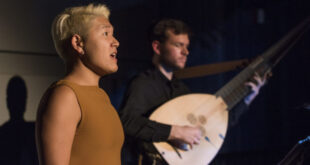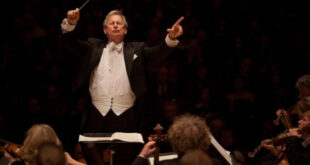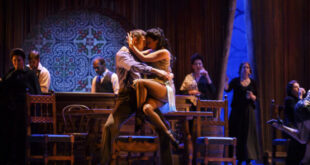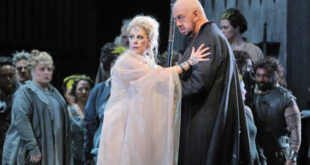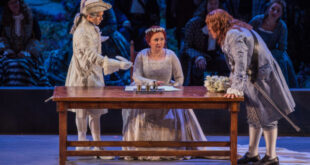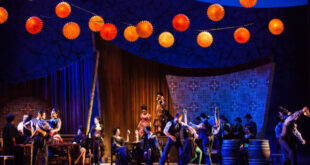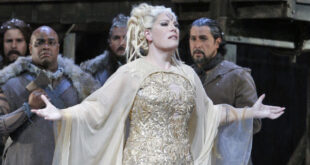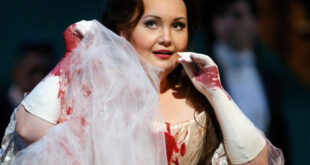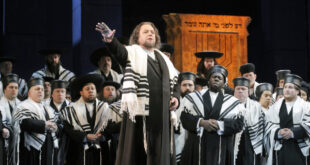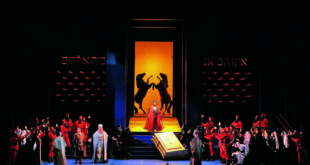All concerned at the very handsome Harris Theater are to be congratulated for staging Monteverdi’s “L’Orfeo,” the first of the three works by that composer to be performed as part of the windup of the international ‘Monteverdi 450’ tour. (A production of this trio of early operas concluded the tour at the Lincoln Center in New York.) For one like myself, who has experienced and has come to love opera based on seeing and hearing operas strictly from the Classic and Romantic periods (Mozart through Puccini) for over half a century, “L’Orfeo” definitely presented some revelations. Most importantly, Claudio Monteverdi …
Read More »Chicago to fete Monteverdi in grand fashion
The serious opera lover would have to go back over half a century, when Maria Callas made her American debut, to find a more prestigious Chicago event than the Monteverdi 450, scheduled for October 12, 13 and 15 at the Harris Theater in Millennium Park. On each of these three dates, one of Claudio Monteverdi’s extant operas will be performed – “L’Orfeo” (1607), “Il ritorno d’Ulisse in patria” (1639) and “L’incoronazione di Poppea” (1642). The performing company is doing an international tour of selected cities, and Chicago is the American première. The only other place in the United States where …
Read More »A review of the Lyric’s “Carmen”
What a treat, to witness one of the great masterpieces of art! “Carmen” is one of those few operas that is so well known that there is little, if no, room for error by any performer. What magnifies this stringent demand is that Georges Bizet’s signature piece of music drama calls for far more vocalists to step into the spotlight than any opera I can think of. The instrumental forces are also needed for consistently brilliant and expressive playing throughout a rather longish composition. Fortunately, the Lyric Opera of Chicago was musically up to the challenges and once again demonstrated …
Read More »A review of the Lyric’s “Norma”
I’m very happy to report that the Lyric production of “Norma” is by far the strongest musically that I’ve witnessed thus far in the 2016-17 season. One would be hard pressed to think of any other contemporary singers who could do any better in the four major roles, especially that of Norma, than those who took the stage at the Civic Opera House. The chorus was also outstanding, and the fine Lyric orchestra turned in yet another solid performance. Bellini was not the creative orchestrator as were the other Italian masters of opera. His instrumental accompaniments are relatively simple, and …
Read More »A review of the Lyric’s “Lucia di Lammermoor”
It has been said about theatrical reviewing that if the reporter writes about the directing, sets and whatnot, then the dramatic performances were probably not all that great. But I will say that the Chicago Lyric Opera 2016-17 staging of Donizetti’s “Lucia di Lammermoor” is one of the very best directed and designed productions I have ever seen. At the same time, however, the performance on Tuesday evening, Nov. 1, was sung magnificently, thanks in great part to the Lyric’s wonderful Lucia, soprano Albina Shagimuratova. Solid conducting, choral and instrumental work all combined to make this performance most memorable. …
Read More »Carmen: The first Verismo opera
“Carmen” has been in the very first circle of popular operas for over a century. Anyone with any level of interest in the Grand Art should develop some kind of familiarity with it. As it is with all other very beloved operas, first and foremost “Carmen” is loaded from beginning to end with beautiful and memorable music — solo arias, ensembles, choruses — and even a number of purely instrumental passages that are unforgettable. The music is the creation of composer Georges Bizet, who unfortunately died young (at 36), and before he knew what a triumph “Carmen” had become. …
Read More »The story behind Bellini’s “Norma”
On one occasion when Maria Callas was asked which was her favorite operatic role, she said she had two — Violetta, from Verdi’s “La traviata” and the title role from Bellini’s “Norma.” When you think about it, it is hard to imagine two more dramatically and psychologically different characters — the emotionally vulnerable and sickly Violetta, forced to be what she is by the callous “man’s world” that is Paris, and Norma, the super-powerful Druid priestess, who can decide peace or war for her people, and life or death for her subordinate priestesses. It is indicative of the soprano’s …
Read More »The story behind “Lucia di Lammermoor”
Ever since its première at the Teatro San Carlo on Sept. 26, 1835, “Lucia di Lammermoor” has held a firm position in the standard opera repertoire. For one thing, it’s Gaetano Donizetti’s greatest musical masterpiece, chock full of brilliant pieces from beginning to end, all brightly colored by the composer’s creative orchestration. For another, the text was very cleverly adapted by Salvatore Cammarano, whom Verdi declared to be the best librettist in Italy, from the 1819 novel, “The Bride of Lammermoor” by Sir Walter Scott, himself no slouch when it came to spinning a tale or turning a phrase. …
Read More »Chorus shines in Lyric’s “Nabucco”
The real star of “Nabucco” is the chorus, and conductor Carlo Rizzi clearly understands this, as he gave the celebrated body their head. And under the direction of Chorus Master Michael Black, they sang more exuberantly than ever, thrilling the jam-packed Civic Opera house audience that braved single-digit temperatures to see the opera that launched Verdi’s career as the King of Italian Opera. Again and again, the chorus, if Hebrews, Babylonians or whatever, made the very most of each choral number. And they were consistently excellent whether singing distinctly as a chorus, like the famous Act III, scene ii “Va, …
Read More »How “Nabucco” changed Verdi’s life
Giuseppe Verdi’s “Nabucco” is one of the most significant works of art ever created. Not only is its impact historic in launching Verdi’s successful career as an opera composer and so decidedly affecting the direction of Romantic opera, but it clearly had a historic impact on Italy and European politics. Indeed, it is difficult to imagine what Europe might look like even today if “Nabucco” had not been staged at La Scala in March 1842. Perhaps the greatest miracle of “Nabucco” was that it was the work of a very troubled young composer — certainly a talented man, but …
Read More » Fra Noi Embrace Your Inner Italian
Fra Noi Embrace Your Inner Italian

